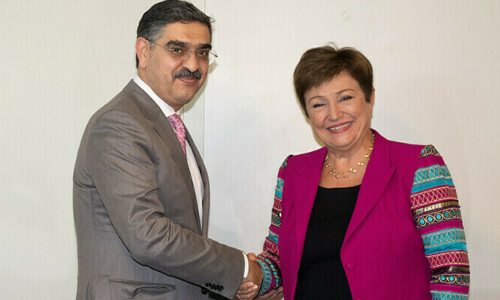The Managing Director of the International Monetary Fund (IMF), Kristalina Georgieva, has urged Pakistan to increase tax collection from the wealthy and protect the poor in the face of rising inflation.
It should be noted that annual inflation in Pakistan reached 27.4% in August, severely impacting people’s household budgets. Additionally, this month, protests erupted across the country due to high electricity bills.
The beleaguered government initially promised some relief to the people but later ruled out the possibility, citing Pakistan’s agreements with the IMF.
Speaking to a private news channel after a meeting with Caretaker Prime Minister Anwar Haq Kakar on the sidelines of the United Nations General Assembly on Wednesday, Kristalina Georgieva said that she believes this aligns with the desires of the Pakistani people.
She stated, “What we are advocating in our program is to please collect more taxes from the wealthy and protect the economically vulnerable people of Pakistan. I believe this aligns with the aspirations of the Pakistani populace.”
After the meeting, in a statement released on the social media platform X (formerly Twitter), the head of the IMF announced that he had discussed the economic situation of the country with the Pakistani Prime Minister.
He added that they agreed on the need for robust policies to ensure stability, promote sustainable and inclusive growth, prioritize tax collection, and safeguard economically vulnerable individuals in Pakistan.
On the other hand, Caretaker Prime Minister Anwarul Haq Kakar also mentioned in a post about the meeting that they had constructive discussions with the IMF director, emphasizing the enhancement of mutual cooperation to promote economic stability and development in Pakistan.
It should be noted that on July 12, the Executive Board of the IMF approved a $3 billion bailout program for Pakistan, with an immediate provision of approximately $1.2 billion, followed by two quarterly reviews. Subsequent disbursements will follow.
The IMF approved the loan program after Saudi Arabia and the United Arab Emirates (UAE) deposited $2 billion and $1 billion, respectively, in the State Bank of Pakistan, leading to an increase in the country’s foreign exchange reserves.
(Islamabad51_Newsdesk)











![Federal Board HSSC results 2024 final date announced [how to check 11th & 12th result] 10 students exam](https://islamabad51.com/wp-content/uploads/2024/08/students-examination-hall-120x86.jpg)

